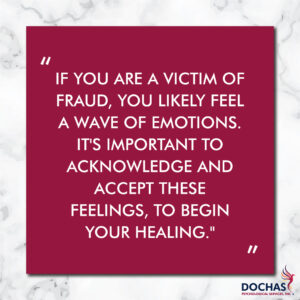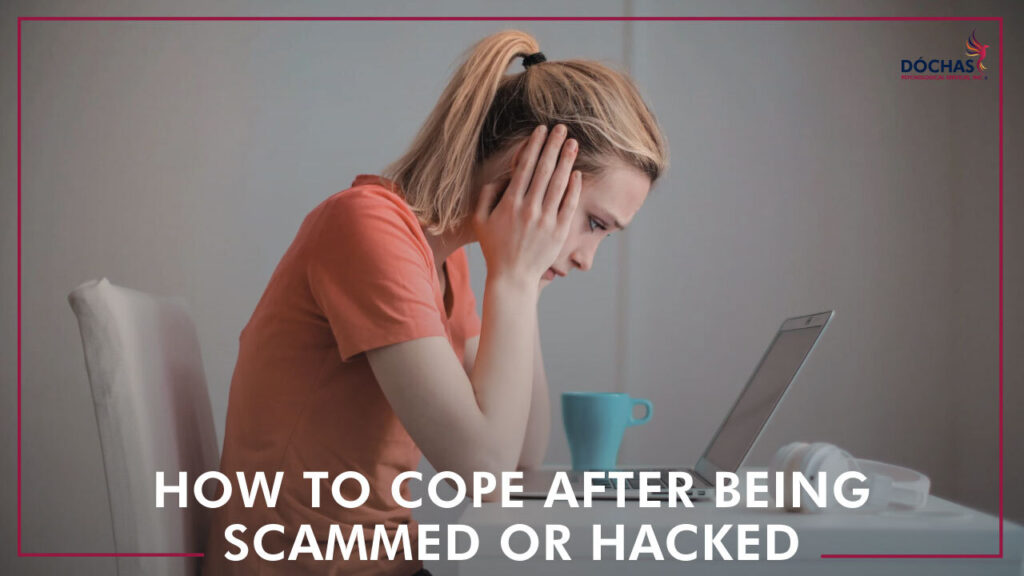If you’ve been scammed or hacked, you know the feelings that rush in: the sinking feeling in your chest, the rush of shame or embarrassment, the anxiety about what to do next, or the feelings of vulnerability. Scams are getting more and more common in our online world, but coping with the aftermath of being scammed or hacked isn’t easy. You might find yourself rushing to change your passwords or getting new credit cards, or even filing a police report, while also navigating and processing the emotions you feel.
It’s Melanie here on the Dochas blog, and I’m going to talk through how to cope after being scammed or hacked. It seems that every week I hear about someone being scammed. Whether it be from social media groups, news media, talk shows, or personal testimony, it seems that there are scams everywhere.

First—forgive yourself. There are many different areas of life where someone can be scammed, and it’s unreasonable to expect that you can predict and prepare for absolutely every possibility. You might feel like you were too trusting, but remember you are not to blame for someone else’s bad behaviour. The blame falls on those who scammed or hacked you.
You’re also not alone. According to the Canadian Anti-fraud Centre, in January of 2022—only the first month of this year—they received 5,569 reports of fraud. Of those 5,569 reports of fraud, there were 3,634 victims who lost a total of 34 million dollars. These are not small numbers, and they demonstrate how all of us can be vulnerable to falling victim to these scammers.
Regardless of what part of your life has fallen victim to scams or fraud, there will likely be emotional and psychological consequences. You might feel vulnerable and helpless, as well as a host of other emotions such as shame and embarrassment, anxiety, guilt, depression and fear, anger, grief, and a loss of trust and sense of security. If this sounds familiar, read on.
Here are some things you can do to help yourself and minimize the negative effects:
Accept Your Emotions
It can be a painful or uncomfortable process to face what you’re feeling inside and accept these emotions, but this step is important for you to begin healing from this trauma. Acknowledge how you feel. The Dochas blog has some helpful tips for sitting with negative emotions here.
Reach Out for Support
When you go through anything difficult in your life, you reach out to your existing support network of both family and friends, and this experience should be no different. Think about who is a safe, supportive person in your life. Your supportive people can help you with the important task of monitoring and changing your thinking. They can help you avoid ruminating about the event and help you adjust any negative self-talk to a positive dialogue. This support will help you through the difficult parts of your healing.
Take Care of Yourself
Self-care is an important part of living a balanced life, but when engaging in the healing process after being scammed, it becomes essential.
Self-care can take many different forms. It can include tending to your physical needs such as eating right, getting enough sleep, and exercising. It can include seeking professional psychological services. It can mean learning skills for mental health such as knowing your limits, implementing healthy boundaries, and saying no when you need to.
Self-care is also engaging in pleasurable activities, so dive into some things you enjoy! Some ideas might be: getting out into nature, tapping into your artistic or musical side, investing in yourself through classes or reading, or tapping into your spirituality.
Supporting a Friend or Loved One Who’s Been Scammed
It might not be you, personally, who is dealing with the aftermath of being scammed or hacked. Maybe it’s someone you love and want to support. If you find yourself in a position to help or support someone else who has fallen victim to a scam, there are several things that you can do. There are also some things you shouldn’t do, to avoid traumatizing them further!
- Provide a listening ear and offer non-judgemental empathy and support. Your friend is likely already judging themselves, so they don’t need judgement from anyone else. Avoid statements that sound judgemental such as:
- “How could you fall for that?”
- “I get those emails/calls all the time and I never fall for it.”
- “That scam has been around forever.”
- Remind them that they are not dumb. Scammers are good at what they do and they use human psychology to fool others. Being scammed is not a sign of weakness but a sign of their humanity.
- Help them focus on what they can do. That can include reporting the scam to the Canadian Anti-Fraud Centre, seeking professional psychological services, and becoming more educated on different kinds of scams and how to avoid them.

These were some strategies for coping with the aftermath of being scammed or hacked. I hope some of these tips will be helpful for you. Be gentle to yourself and remember that you are not to blame.
If you find that you want some professional help as you navigate your emotions after this experience, reach out to us here at Dóchas Psychological Services. You can reach us by email at info@dochaspsych.com, or by phone at 780 446 0300. Take care of yourself!
~~
Key Takeaway:
If you’re been scammed or hacked, you are not to blame. Process your emotions by acknowledging them, reaching out to your supportive people, and practicing self-care.
~~
Resources
- https://www.lifepathscounseling.com/emotional-support-fraud-scams/
- Wilson, C. (2021). The Emotional Impact of Being Scammed and How to Recover. LifePaths PPLC. ISBN: 1734571454.
- https://public.tableau.com/app/profile/federal.trade.commission/viz/eConsumer/Infographic
About Dóchas Psychological
Dóchas Psychological Services is a well-established and trusted therapy clinic located in Spruce Grove, Alberta. At Dóchas we value the idea that everyone deserves a safe space. Through connection and education, our team works hard to build a trustworthy relationship with each of our clients. It is our goal to create a community for our clients to feel like they belong.
Disclaimer
Information provided through Dóchas Psychological Services blogs or vlogs is meant for educational purposes only. They are NOT medical or mental health advice. You can read more about our disclaimer here.

